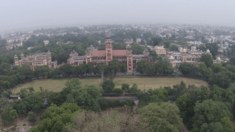Chunni Lal Khetrapal
Chunni Lal Khetrapal (born 1937) is an Indian chemical physicist and a former vice chancellor of Allahabad University.[1] He is known for his studies chemical physics, particularly in the field of Nuclear magnetic resonance spectroscopy.[2] He is an elected fellow of the Indian National Science Academy[3] and the National Academy of Sciences, India.[4] The Council of Scientific and Industrial Research, the apex agency of the Government of India for scientific research, awarded him the Shanti Swarup Bhatnagar Prize for Science and Technology, one of the highest Indian science awards, in 1982, for his contributions to chemical sciences.[5]
Chunni Lal Khetrapal | |
|---|---|
| Born | 25 August 1937 Uttar Pradesh, India |
| Nationality | Indian |
| Alma mater |
|
| Known for | Studies on Nuclear magnetic resonance spectroscopy |
| Awards | |
| Scientific career | |
| Fields | |
| Institutions |
|
Biography

C. L. Khetrapal, born on 25 August 1937 in the Indian state of Uttar Pradesh, did his college studies at Allahabad University from where he graduated in 1957 and completed his master's degree in 1959.[6] He started his career by joining Atomic Energy Establishment Training School, Mumbai the same year, simultaneously doing his doctoral research at Mumbai University to secure a PhD in 1965. In between, he worked at Tata Institute of Fundamental Research for a while and moved to Switzerland where he did his post-doctoral studies at the University of Basel from 1967 till 1969 when he shifted his base to the US to work at Liquid Crystal Institute of Kent State University as a research assistant. He returned to India in 1973 and joined Raman Research Institute as an assistant professor where he spent over eleven years till his move to the Indian Institute of Science as a professor and the head of the Sophisticated Instruments Facility in 1984. On his superannuation from service in 1998, he was appointed as the vice chancellor of Allahabad University.[1] When his tenure ended in 2001, he joined Sanjay Gandhi Postgraduate Institute of Medical Sciences as a distinguished professor for a five-year term (2001–06) and also held the directorship of Centre of Biomedical Magnetic Resonance, Lucknow, an autonomous research centre of the Government of Uttar Pradesh. In between, he had two stints at National Institutes of Health as a visiting scientist during 1979–80 and in 1984.[3]
Legacy
Using nuclear magnetic resonance spectroscopy (NMR), Khetrapal studied the molecules orientation in the nematic phase of liquid crystals, the non-planar distortions in peptides in the liquid phase and weak molecular interactions involved in hydrogen bonding.[7] Apart from pioneering NMR studies in India, he established Institute of Interdisciplinary Studies and Institute of Professional Studies at Allahabad University.[3] His contributions are also reported behind the establishment of the National Centre on NMR in Bangalore. He has published a number of articles and books, besides contributing chapters to books published by others including the 8-volume Encyclopedia of Nuclear Magnetic Resonance.[8] He was one of the founders of the National Magnetic Resonance Society and the Centre of Biomedical Magnetic Resonance and served as the first president the former and is an incumbent director of the latter.[3]
Awards and honors
The Council of Scientific and Industrial Research awarded Deb the Shanti Swarup Bhatnagar Prize, one of the highest Indian science awards, in 1982.[9] He is also a recipient of the C. V. Raman Award of the University Grants Commission of India (1996), Goyal Prize (1996), P. C. Ray Memorial Medal of the Indian Science Congress Association (2002) and the Lifetime Achievement Award of the Indian Chemical Society (2005).[3] He has delivered several award orations including the R. K. Asundi Memorial Lecture Award of the Indian National Science Academy in 1990[10] and N. R. Dhar Memorial Lecture Award of National Academy of Sciences, India in 2005.[11] He is an elected fellow of the Indian National Science Academy and the National Academy of Sciences, India.[4]
References
- "Former vice chancellors". Allahabad University. 2016.
- "Brief Profile of the Awardee". Shanti Swarup Bhatnagar Prize. 2016. Retrieved 12 November 2016.
- "Indian fellow". Indian National Science Academy. 2016.
- "NASI fellows". National Academy of Sciences, India. 2016. Archived from the original on 15 March 2016. Retrieved 12 November 2016.
- "View Bhatnagar Awardees". Shanti Swarup Bhatnagar Prize. 2016. Retrieved 12 November 2016.
- "Director profile" (PDF). Centre of Biomedical Magnetic Resonance. 2016.
- "Handbook of Shanti Swarup Bhatnagar Prize Winners" (PDF). Council of Scientific and Industrial Research. 1999. p. 34. Archived from the original (PDF) on 4 March 2016. Retrieved 5 October 2016.
- Robin K. , Grant; D.M. Harris, eds. (1996). Encyclopedia of Nuclear Magnetic Resonance. John Wiley & Sons. ISBN 978-0471938712.
- "Chemical Sciences". Council of Scientific and Industrial Research. 2016. Archived from the original on 12 September 2012. Retrieved 7 November 2016.
- "R. K. Asundi Memorial Lecture Award". Indian National Science Academy. 2016.
- "N. R. Dhar Memorial Lecture Award". National Academy of Sciences, India. 2016.